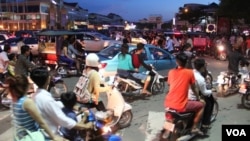Police have collected some $50,000 in traffic fines since they began implementing a new traffic law, officials say.
About 70 percent of those fines have come from traffic checkpoints, according to the ministries of Interior and Finance.
Police have also been issuing paper tickets with receipts, rather than asking for cash, which has helped the ministries track the money.
Political analysts say the traffic fines represent something new to many Cambodians, who are used to a corrupt and arbitrary system, where police stop traffic and negotiate bribes, rather than issue tickets.
“The management of the financial system in the country is accustomed to serious corruption, that’s why the new system to manage traffic fines is rated a low success,” said San Chey, a fellow with the Affiliated Network for Social Accountability in East Asia.
How the money is divided among police, who are incentivized to give tickets, could also be a problem, he said. “Those who fine more, get more money. All of them should be fairly paid.”
Nep Sinthai, director of the Advocacy and Policy Institute, said the budget should pay for traffic education and other development, including traffic lights and signage. Police still need more pay, he added.







